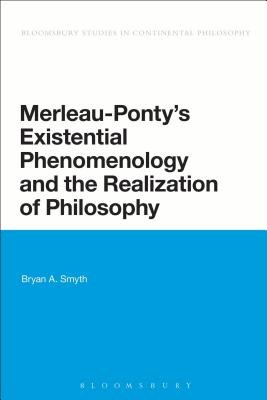
- We will send in 10–14 business days.
- Author: Brian Smith
- Publisher: Bloomsbury Publishing PLC
- Year: 2014
- Pages: 204
- ISBN-10: 1780937059
- ISBN-13: 9781780937052
- Format: 15.6 x 23.4 x 1.4 cm, kieti viršeliai
- Language: English
- SAVE -10% with code: EXTRA
Merleau-Ponty's Existential Phenomenology and the Realization of Philosophy (e-book) (used book) | bookbook.eu
Reviews
Description
Bringing to light the essential philosophical role of Marxism within Merleau-Ponty's reinterpretation of transcendental phenomenology, this book shows that the realization of this project hinges methodologically upon a renewed conception of the proletariat qua universal class-specifically, that it rests upon a humanist myth of incarnation which, substantiated by Merleau-Ponty's notion of 'heroism', locates an objective historical purposiveness in the habituated organism of the modern subject.
Foregrounding the phenomenological priority of history over corporeality in this way, Smyth's analysis recovers the 'militant' character of Merleau-Ponty's existential phenomenology. It thus sheds critical new light on his early thought, and challenges some of the main parameters of existing scholarship by disclosing the intrinsic normativity of his basic methodological commitments.
EXTRA 10 % discount with code: EXTRA
The promotion ends in 23d.00:28:04
The discount code is valid when purchasing from 10 €. Discounts do not stack.
- Author: Brian Smith
- Publisher: Bloomsbury Publishing PLC
- Year: 2014
- Pages: 204
- ISBN-10: 1780937059
- ISBN-13: 9781780937052
- Format: 15.6 x 23.4 x 1.4 cm, kieti viršeliai
- Language: English English
Bringing to light the essential philosophical role of Marxism within Merleau-Ponty's reinterpretation of transcendental phenomenology, this book shows that the realization of this project hinges methodologically upon a renewed conception of the proletariat qua universal class-specifically, that it rests upon a humanist myth of incarnation which, substantiated by Merleau-Ponty's notion of 'heroism', locates an objective historical purposiveness in the habituated organism of the modern subject.
Foregrounding the phenomenological priority of history over corporeality in this way, Smyth's analysis recovers the 'militant' character of Merleau-Ponty's existential phenomenology. It thus sheds critical new light on his early thought, and challenges some of the main parameters of existing scholarship by disclosing the intrinsic normativity of his basic methodological commitments.


Reviews